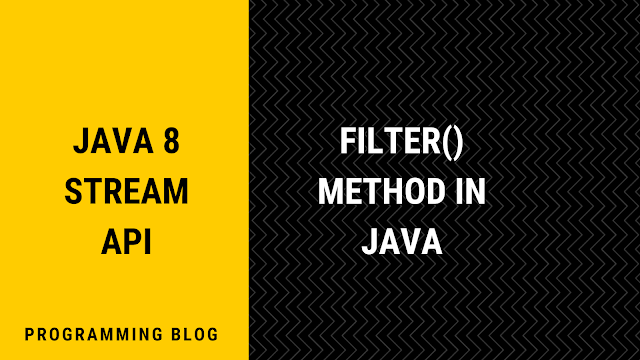Java 8 Stream Filter with Lambda Expression
 |
| Java 8 Stream Filter() method with Examples |
What is Filter in Java Stream?
Simply, as a name suggest it filters data based on given predicate (boolean) Condition. The condition is applied to all element of Stream, and those who satisfied the condition moves to next stage and those who does not pass filtered out.
For example, If you want to filter list of Integer based on greater than some value or if you want to get even or odd data then you can easily filtered out.
Stream Filter() method is Intermediate Operation.
If you want to learn about difference between Intermediate and Terminal operation check out:-
The benefit of using filter() method is lazy evaluation. Means no data comparison is performed unless you call a terminal operation like forEach() or Collect().
We will use Lambda expression for filter elements based on given Predicate. Learn more about Lambda Expression :
Lets see how filter method works using examples.
Example 1 :- Filter Odd or Even numbers on given List
import java.util.Arrays;
import java.util.List;
import java.util.stream.Collectors;
public class FilterDemo {
public static void main(String[] args) {
List<Integer> list = Arrays.asList(1,2,3,4,5,6,7,8,9,10);
// Get Even Numbers
System.out.println("Even Numbers");
list.stream().filter(number -> number % 2 == 0)
.forEach(System.out::println);
// Get Odd Numbers
// Filtered and collect in list
List<Integer> filteredList = list.stream()
.filter(number -> number % 2 != 0)
.collect(Collectors.toList());
System.out.println("Odd Numbers");
System.out.println(filteredList);
}
}
Output :-
Even Numbers
2
4
6
8
10
Odd Numbers
[1, 3, 5, 7, 9]
Explanation :-
- In first filter, filtered odd numbers and print even numbers using forEach() terminal method.
- In second filter, filtered out even data and collect odd numbers to new list using collect() Method.
Example 2 :- Filter() method on String of List
package Java8;
import java.util.ArrayList;
import java.util.List;
public class FilterDemo {
public static void main(String[] args) {
List<String> list = new ArrayList<>();
list.add("Java");
list.add("JavaScript");
list.add("Python");
list.add("Php");
list.add("Angular");
list.add("C++");
list.add("React");
list.add("C#");
list.add("NodeJs");
list.add("AI");
// String greater than 4
System.out.println("String greater than 4");
list.stream()
.filter(string -> string.length() > 4)
.forEach(System.out::println);
System.out.println("String Start with char J");
list.stream()
.filter(string -> string.startsWith("J"))
.forEach(System.out::println);
}
}
Output :-
String greater than 4
JavaScript
Python
Angular
React
NodeJs
String Start with char J
Java
JavaScript
We can apply multiple filter also on same list. Example, we can filter condition for odd or even number and also number can be greater than some number.
lets see example of applying multiple filter().
Example 3 :- Java 8 Multiple Filter() Example
import java.util.ArrayList;
import java.util.List;
public class FilterDemo {
public static void main(String[] args) {
List<String> list = new ArrayList<>();
list.add("Java");
list.add("JavaScript");
list.add("Python");
list.add("Php");
list.add("Angular");
list.add("C++");
list.add("React");
list.add("C#");
list.add("NodeJs");
list.add("AI");
System.out.println("Multiple Filter : "
+ "Start with J and Length greter then 4");
list.stream()
.filter(string -> string.startsWith("J"))
.filter(string -> string.length() > 4)
.forEach(System.out::println);
System.out.println("Multiple Filter : "
+ "start with C and find first filterd string");
String filterdString = list.stream()
.filter(string -> string.startsWith("C"))
.findFirst().get();
}
}
Output :-
Multiple Filter : Start with J and Length greter then 4
JavaScript
Multiple Filter : start with C and find first filterd string
C++
We have seen how to filter List of Integer and List of String, So lets see how to filter Data based on list of Objects.
We will create custom java class, add two fields name and salary and filtered out data by salary property.
Example 4 :- Java 8 Filter on list of Object properties
User.java
package Java8;
public class User {
private String name;
private Integer salary;
public User(String name, Integer salary) {
this.name = name;
this.salary = salary;
}
public String getName() {
return name;
}
public void setName(String name) {
this.name = name;
}
public Integer getSalary() {
return salary;
}
public void setSalary(Integer salary) {
this.salary = salary;
}
@Override
public String toString() {
return "User [name=" + name + ", salary=" + salary + "]";
}
}
FilterDemo.java
package Java8;
import java.util.ArrayList;
import java.util.Arrays;
import java.util.List;
import java.util.stream.Collectors;
public class FilterDemo {
public static void main(String[] args) {
List<User> list = Arrays.asList(
new User("User 1", 10000),
new User("User 2", 20000),
new User("User 3", 30000),
new User("User 4", 40000)
);
List<User> filterdUser = list.stream()
.filter(user -> user.getSalary() > 21000)
.collect(Collectors.toList());
System.out.println(filterdUser);
}
}
Output :-
[User [name=User 3, salary=30000], User [name=User 4, salary=40000]]
You can see how easily we can filter our data with Java 8 Stream filter() method.
Conclusion :
We learned about :
- How to use stream filter() method based on given condition.
- We use forEach() method for printing filtered elements after filter() method.
- We also seen how to use collect() method for collecting filtered elements and store into another list.
- How to use multiple filter condition simultaneously on list.
- How to filter out data by custom object properties.
Happy Reading, Happy Coding.
Check out Other Java 8 Stream Methods :-
- Collect() Method in Java 8 Stream API
- Map() Method in Java 8 Stream API
- Reduce() Method in Java 8 Stream API
Other Articles you may like :-
Comments
Post a Comment